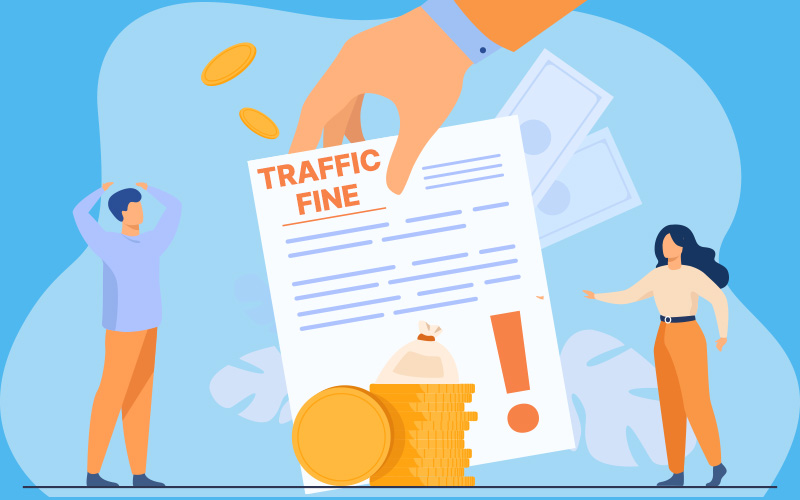What Every Driver Needs to Know About Traffic Violation Tickets

Understanding a traffic violation ticket is crucial for every driver. Whether you are an experienced motorist or a new driver, the legal and financial implications of receiving a traffic violation ticket can be significant. These tickets are issued when drivers fail to comply with traffic laws and regulations, and they can range from minor infractions to serious offenses. This article will provide a comprehensive overview of traffic violation tickets, including the common types of violations, consequences, how to deal with a ticket, and tips for avoiding them in the future.
Traffic Violation Ticket?
A traffic violation ticket is an official notice issued by law enforcement officers to a motorist or other road user, accusing them of violating traffic laws. The ticket serves as a legal document that outlines the specific offense committed, along with the applicable fines, penalties, and instructions on how to contest or pay the ticket. Traffic violation tickets are part of the broader traffic enforcement system designed to promote road safety and regulate driver behavior.
There are two main categories of traffic violations: moving violations and non-moving violations. Moving violations occur when a vehicle is in motion, such as speeding or running a red light. Non-moving violations usually involve parking infractions, expired vehicle registration, or defective equipment. Regardless of the category, receiving a traffic violation ticket can have consequences that extend beyond just a fine.
Common Types of Traffic Violation Tickets
Traffic violation tickets can be issued for a wide range of offenses. Some of the most common include:
Speeding
This is one of the most frequent causes of traffic violation tickets. Speeding not only increases the risk of accidents but also violates posted speed limits designed to ensure road safety.
Running Red Lights or Stop Signs
Disobeying traffic signals and signs is a serious offense. It can result in dangerous situations at intersections and leads to many accidents each year.
Driving Without a Valid License or Insurance
Operating a vehicle without a valid driver’s license or insurance is illegal and typically results in a traffic violation ticket, as well as additional legal repercussions.
Reckless or Dangerous Driving
Reckless driving includes behaviors such as weaving in traffic, tailgating, or making aggressive lane changes. Such conduct can result in a traffic violation ticket and even criminal charges in severe cases.
Distracted Driving
Using a mobile phone or engaging in other distractions while driving is a growing cause of accidents. Many jurisdictions have strict laws that penalize drivers caught engaging in distracted driving.
DUI and Impaired Driving
Driving under the influence of alcohol or drugs is one of the most severe offenses. It often leads to arrest, a traffic violation ticket, license suspension, and even imprisonment.
Parking Violations
Though less severe, parking infractions such as parking in a no-parking zone or blocking a fire hydrant can still result in fines and tickets.
Consequences of Receiving a Traffic Violation Ticket
A traffic violation ticket can lead to a range of consequences depending on the severity of the offense. These may include:
Financial Penalties
Most traffic violation tickets come with a fine that must be paid by a specified date. Fines can vary depending on the jurisdiction and nature of the offense.
Demerit Points
In many regions, traffic violations add demerit points to your driving record. Accumulating too many points can result in license suspension or mandatory driving courses.
Increased Insurance Rates
Insurance companies monitor driving records closely. A traffic violation ticket can lead to higher premiums as insurers view you as a higher-risk driver.
License Suspension
Repeated violations or serious offenses such as DUI can result in the suspension or revocation of your driver’s license.
Legal Proceedings
Certain violations may require you to appear in court. Failure to do so can lead to additional penalties, including arrest warrants.
How to Handle a Traffic Violation Ticket
If you receive a traffic violation ticket, it’s essential to know your options and how to respond appropriately.
Review the Ticket
Carefully read the ticket to understand the alleged offense, fine amount, court date, and instructions for payment or dispute.
Decide Whether to Pay or Contest
You typically have the option to either pay the fine or contest the ticket in court. Paying the fine may be the quickest option, but it’s an admission of guilt. Contesting the ticket may help you avoid fines or demerit points if you believe the ticket was unjustly issued.
Gather Evidence
If you decide to dispute the ticket, gather all relevant evidence such as photographs, witness statements, or dashcam footage. This can support your case during the hearing.
Hire a Legal Professional
For serious traffic violations, hiring a traffic lawyer or paralegal may improve your chances of a favorable outcome. They can help you navigate the legal system and negotiate reduced charges or penalties.
Tips to Avoid Traffic Violation Tickets
Prevention is the best strategy when it comes to traffic tickets. Here are some practical tips to help you avoid receiving a traffic violation ticket:
Follow Traffic Laws
Obey speed limits, traffic signals, and road signs. These rules are in place to keep everyone safe on the road.
Stay Alert and Avoid Distractions
Keep your focus on the road. Avoid using your phone, eating, or engaging in other activities that divert your attention while driving.
Maintain Your Vehicle
Ensure your vehicle is in good working order, with functioning lights, brakes, and mirrors. This helps you avoid equipment-related violations.
Keep Documentation Up-to-Date
Always carry a valid driver’s license, registration, and proof of insurance. Ensure these documents are renewed before they expire.
Use Caution in Unfamiliar Areas
When driving in a new city or neighborhood, pay close attention to local traffic signs and rules. Each area may have specific regulations that differ from what you’re used to.
Final Thoughts
A traffic violation ticket may seem like a minor inconvenience, but it can lead to long-term financial and legal consequences if not addressed properly. Understanding what constitutes a traffic violation, knowing your rights and options, and practicing safe driving habits are essential steps to maintaining a clean driving record. By staying informed and vigilant behind the wheel, you can reduce your risk of receiving a traffic violation ticket and ensure a safer driving experience for yourself and others on the road.




